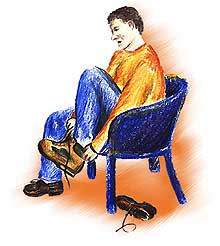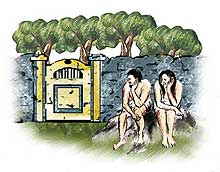Now, just before you attempt to sort out your themes, print out the following section, and take it to a comfortable place to read and mull over.
 This exercise, around a story which most people are familiar with, is designed to encourage your themes to emerge!
This exercise, around a story which most people are familiar with, is designed to encourage your themes to emerge!
At the end of the exercise you will be asked “how do you feel?” So try and imagine yourself in the story. There are no correct responses–we have found that there is a wonderful variety in people’s reactions to the same story. Despite this variety of emotional reaction, it seems that people across the world in all classes, races and cultures share certain types of themes in common. Many of these themes have to do with belonging, being loved (or not loved), purpose and meaning, and life and death.
Artists, authors and poets often explore these themes, and we find their creations transcend cultural and language barriers. Myths, fairy stories and heroic tales (both true and imaginary) of love, hate, war and peace fascinate us all, and we can usually find ourselves somewhere in them if we care to look below the surface.
We will now describe for you one primitive scene, a scene from the Christian tradition. We could choose many other scenes, myths or legends, from many other cultural or religious traditions. The point is how you yourself feel as you insert yourself into the drama.
Take time on this. Make yourself comfortable.

Let’s go! Imagine yourself walking around a beautiful garden, filled with tall majestic trees and colourful scented flowers and shrubs.
The grass is green and lush under your bare feet, and you pause for a moment beside a still lake.
The trees, sky and clouds are reflected in the water, and the sun is warm on your face.
Walking beside you is your best friend.
No fear or danger exists in this place–all is well.
You are filled with a sense of being completely safe, and greatly loved.
Suddenly, disaster strikes!

In a rapid sequence of events you are forcefully expelled from the garden. You have some sort of understanding that you made a terribly wrong choice back there inside the garden. Something to do with trusting or not trusting, and now it is too late.
You are now outside the garden, with no hope of returning. Imagine yourself sitting against a large rock, your companion beside you, about 200 metres from the garden which is surrounded by a high wall. There is a gate but it is barred, and guarded by creatures with flashing swords.
You are outside, and there is no way back.
Now put this sheet down.
How do you feel?
What do you feel as you sit under that rock?
Have a look at the list of themes again if you need to. We find some feel a deep sense of rejection. Some feel intensely alone, some angry and determined to march off and cope anyway, others blaming of their companion, and so on. Often people find a mixture of many feelings and themes.
Take plenty of time with this.
It may give you vital clues to your own themes.
Move on when you are ready…
 I suggest you now put your ‘story’ (beginnings and fluctuations), your feelings, and your themes together and have a good hard look at them.
I suggest you now put your ‘story’ (beginnings and fluctuations), your feelings, and your themes together and have a good hard look at them.
Bring out your Mood/Stress and Symptom Graphs too. Have a look at occasions when your symptoms increased or your mood fell or your stress levels rose.
Ask yourself what themes seem to be emerging for you.
As an extra exercise try and relate these themes to some of the episodes you are seeing on your graphs. This might be easy or difficult. Don’t get too worried about the last bit as sometimes the graphs are hard to read.
 Now we suggest you list the outward effects of your themes on your life.
Now we suggest you list the outward effects of your themes on your life.
Consider the following subject areas and after each one put a statement (the examples we give after each category relate to the same imaginary person):
Relationships: e.g. “I fear rejection so I avoid new social settings so I have few friends and am bored. I tend to work so as to avoid these feelings
Communication: e.g. I think I am quite a good listener, though my wife thinks I don’t give enough feed-back-she says she doesn’t know what I am thinking or feeling. I do avoid rows. I work harder if I think something is brewing. I leave her to deal with the kids. I think I use my headaches, and bowel problems as an excuse. She gets the message she shouldn’t trouble me.
Work and career: e.g. “I work too hard. If I stop I feel uneasy and a bit empty and lonely. I think it is because work is the only way I feel life is meaningful. My Dad worked all the time.
Play and pleasure: e.g. “I find holidays hard. Don’t quite know what to do with myself. The kids like doing simple things but they aren’t natural to me. My Dad didn’t do much with me.
Sex and intimacy: e.g. my partner complains that I’m always tired. Sex was one place where I could feel close, though she complains that I hurry things. I was never much good with the touchy-feely things. There was no touching in our family.
Habits and lifestyle
Plans/vision for the future

Many of us struggle or have struggled with these themes.
They are the stuff of human experience and history.
They are part and parcel of every day life and when present in small measure they are often manageable and do not break through into significant health problems, even though they may determine the quality of any particular day.
But they can be present with a degree of intensity that be quite difficult to manage, or affect our lives and behaviors in ways we wish could be changed.
You may be finding by now that you are managing to change things a little or even substantially. Some who have got to here will have found that their symptoms have improved or even gone.
But if you are still struggling why not take what you have done to a competent counselor or therapist and ask them to help you focus it up? These people are trained to look at this sort of material and to ask the questions which help clarify things.
Even if you have done well to this point you may well benefit from extra input from a therapist or counselor.